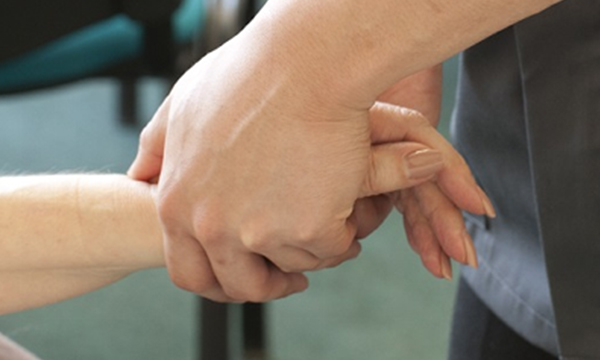What is Osteopathy?
Musculoskeletal (MSK) problems are varied and can cause pain, stiffness and reduced function anywhere in the body from headaches to foot pain and everywhere in between. Whether it’s back pain, knee arthritis or an ankle sprain, if you’re not feeling 100% it can limit your ability to get on with all aspects of life such as work, playing with and lifting children, exercise and sleep.

Osteopaths are primary healthcare professionals who specialise in diagnosing and treating MSK conditions. MSK conditions can arise for a variety of reasons such as sports injury, normal ageing processes, postural habits and repetitive behaviours or they can be a symptom of syndromes such as fibromyalgia. MSK problems primarily affect muscles, bones, joints, ligaments and tendons.
Osteopaths make a diagnosis by discussing your medical history and examining you. Problems often arise due to imbalance elsewhere in the body, for example knee pain that has arisen due to hip or back problems. Osteopaths take a holistic view of the way your body is functioning to develop a treatment plan that is tailored to your needs.
Osteopathic treatments are varied and may include ‘hands on’ manual therapy techniques such as massage, stretching, joint mobilisation and manipulation as well as cranial methods. Frequently osteopathy includes offering postural, ergonomic and lifestyle advice as well as exercise suggestions to help you take control.
What does osteopathic training involve?
Osteopaths hold either a bachelor’s degree in osteopathy (a BSc Hons, B.Ost or BOstMed) or a masters degree (M.Ost). Courses usually consist of four years of full-time training or five years part-time. A degree course includes anatomy, physiology, pathology, pharmacology, nutrition and biomechanics, plus at least 1,000 hours of clinical training. Once qualified , an osteopath must apply to be registered with the General Osteopathic Council (GOsC) in order to practise in the UK. The title ‘osteopath’ is protected by law and only qualified, registered and insured osteopaths call themselves by this title.
What can Osteopaths treat?
Osteopaths treat a range of conditions including (but not limited to):
Osteopaths treat the individual not the condition. Treatment is safe, gentle and suitable for most people, including during pregnancy.
If you are unsure about whether treatment is suitable for you, please contact us
- Arthritic pain
- Back and neck pain
- Neck pain
- Joint aches and pains
- Shoulder, elbow, wrist, hand, knee, hip and ankle sprains and pain
- Sports injuries
- Sciatica
- Headaches and migraine prevention
- Muscles strains, spasms and tears
- Postural imbalances
- Fibromyalgia
- Nerve entrapments and neuralgia
- Tension and inability to relax
Frequently asked questions
What to expect from your experience
What happens at the first appointment?
At the first appointment your osteopath will take a detailed case history. This will include asking questions about the problem area and also about previous injuries, your general health and lifestyle. The osteopath will also conduct a physical examination, including asking you to make certain movements. Following a full assessment your osteopath will explain their diagnosis and discuss treatment options with you, including how many sessions are likely to be required.
Do I need to bring anything with me to my appointment?
If you have any x-ray, MRI or any other test or scan results please bring details of these with you to the appointment if you can. Also please bring a list of any medication you’re taking to save time during the initial appointment.
What should I wear? Do I need to undress?
Your osteopath will need to look at and manually assess the affected area, as well as your standing posture and movements. Normally you will be asked to dress down to your underwear so that we can make a full assessment. It’s harder to understand what’s going on if we can’t see the areas in question. However, it’s also important that you feel comfortable so if you would prefer to wear something close fitting, like sports wear, please do so. Once an assessment has been made, we can use towels and blankets during treatment to keep you relaxed and comfortable.
Are there any side effects to Osteopathic treatment?
As with other manual therapies such as massage, physiotherapy or acupuncture, you may experience some mild to moderate discomfort during or after your treatment. This is normal and usually lasts 24-48 hours at most. During your treatment, the osteopath will regularly explain what technique they are using, what they hope to achieve with it and whether there are likely to be any side effects. Treatment is always with your informed consent- if you don’t want to pursue a particular technique there is always an alternative. If you are feeling too much pain, you can ask your osteopath to stop what they are doing at any time.
What happens if I feel worse after treatment?
If you exercise regularly or do manual tasks like gardening, you will be familiar with the aching pain and stiffness that can follow these activities. These aches and pains are normal if they last 24-48 hours after doing something intense and they will gradually subside. If anything, these symptoms are a good sign because they mean that you have been working, moving and strengthening your body- this is what we’re built to do. Osteopaths move and stretch muscles and joints, and in doing so they trigger similar responses- this can mean that you might experience new strong sensations or symptoms after a treatment. Follow the advice that your osteopath gave you in the session with regard to heat, ice, movement and exercise and your discomfort should subside within 1-2 days. However, if your symptoms are getting worse or not improving, or if you’ve developed new symptoms that are concerning you, contact us by phone for advice.
Appointments and Cancellations
What is your cancellation policy?
Wherever possible, please provide a minimum of 24 hours’ notice to cancel or reschedule your appointment. Unfortunately, if we are given less than 24 hours’ notice to cancel, we will still need to charge you for your appointment. Contact us to cancel or reschedule.
How many appointments will I need?
Some clients require only 1-2 sessions, whereas more complex or chronic conditions benefit from more treatment. Other clients who are managing chronic conditions find that regular sessions help them to keep active and comfortable. Every treatment plan is bespoke – we will only recommend follow up appointments if we think they will benefit you.
Do I need a referral from my GP to see an Osteopath?
You do not need referral from a GP to see an Osteopath. Osteopaths are primary healthcare professionals, qualified to diagnose and treat musculoskeletal disorders.
What do I do if I’m unhappy with my treatment?
In the first instance, you should raise this with your osteopath, ideally at the time you have concerns. If that is not possible, you could raise your concerns verbally or in writing by contacting us here. Osteopathy is a regulated profession; if we are not able to address your concerns to your satisfaction, you have the option of contacting the General Osteopathic Council https://www.osteopathy.org.uk/standards/complaints/

